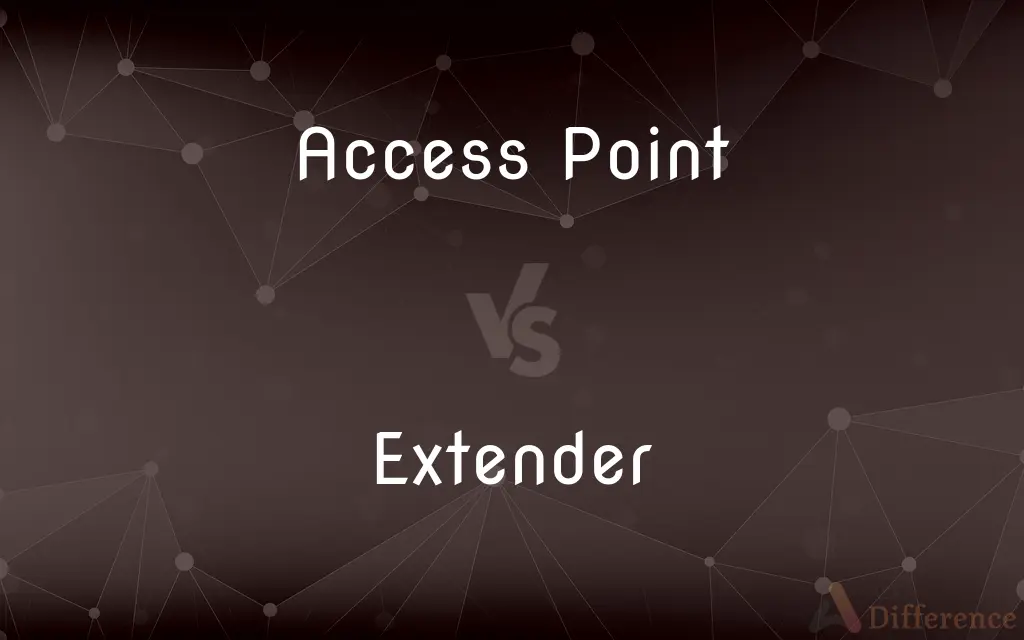Access Point vs. Extender — What's the Difference?
By Tayyaba Rehman & Fiza Rafique — Published on November 29, 2024
Access Points create a wireless local network for devices to connect, while Extenders boost an existing network's coverage. Both enhance connectivity but serve different purposes.

Difference Between Access Point and Extender
Table of Contents
ADVERTISEMENT
Key Differences
Access Points (APs) are devices that create a local wireless network for devices to connect to, essentially bridging a wired network to wireless devices. Extenders, on the other hand, take an existing wireless signal and amplify or extend its reach to cover larger areas where the signal might be weak.
An Access Point connects directly to a wired network, usually through an Ethernet cable, and serves as a central transmitter and receiver of wireless signals. This setup is ideal for creating a new Wi-Fi zone in areas without existing wireless coverage. Extenders, however, do not create new networks; they extend the coverage of an existing network by receiving the wireless signal from the router and retransmitting it.
Installation and configuration of Access Points can be slightly more complex, requiring integration into an existing wired network and possibly configuring IP addresses. Extenders are designed for ease of use, often requiring just a press of the WPS button to connect to the router and start extending the network.
Access Points can support a larger number of devices with more stable connections due to their direct connection to the network, while Extenders might reduce the bandwidth of the extended signal, potentially leading to slower internet speeds in the extended coverage area.
Access Points are suited for businesses or larger spaces needing robust and scalable wireless networks, whereas Extenders are more suited for home use, where extending the reach of an existing network to dead zones is the primary concern.
ADVERTISEMENT
Comparison Chart
Primary Function
Creates a new wireless network
Extends the coverage of an existing network
Connection Type
Wired connection to router or switch
Wireless connection to the router
Network Performance
Can support higher speeds and more devices
May reduce speed due to signal retransmission
Installation
Requires configuration with wired network
Plug-and-play, minimal configuration
Best Used For
Large areas or businesses needing robust networks
Small areas with weak signal coverage
Compare with Definitions
Access Point
Serves as a central hub for wireless devices to connect to a LAN.
The Access Point can handle up to 50 connections simultaneously.
Extender
A device that receives an existing Wi-Fi signal and retransmits it to extend coverage.
We used an Extender to get Wi-Fi in the basement.
Access Point
A device that connects to a wired network and provides wireless access to devices.
To improve Wi-Fi in the office, we installed an Access Point on each floor.
Extender
Ideal for eliminating Wi-Fi dead zones within a home.
Installing an Extender upstairs improved our signal dramatically.
Access Point
Often used to create or expand a wireless network in a business setting.
The new Access Point expanded our Wi-Fi coverage to the warehouse.
Extender
Connects wirelessly to the router, requiring no wired connection.
The Extender was easy to set up, with no cables needed.
Access Point
Requires a wired connection to the network to function.
We ran an Ethernet cable to the Access Point for optimal performance.
Extender
Simple to install, often just needing a power outlet.
I plugged the Extender in near the staircase, and it worked perfectly.
Access Point
Supports various security protocols to protect the network.
The Access Point was configured with WPA3 for enhanced security.
Extender
May slightly reduce internet speed due to signal retransmission.
The Wi-Fi is slower in the extended area but still usable.
Extender
A substance added to another substance to modify, dilute, or add to it
Meatloaf that contained oatmeal as an extender.
Extender
Any of various substances designed to extend any of several properties of a material.
Extender
Any of various components designed to extend the length of a device.
Extender
One who, or that which, extends or stretches anything.
Common Curiosities
What is an Access Point?
A device that connects to a wired network to create a wireless access point for devices.
What is an Extender?
A device that amplifies an existing wireless signal to extend its coverage area.
Can an Extender be used as an Access Point?
Some models can function as both, but typically, Extenders are not designed to create new networks.
Are Extenders compatible with all routers?
Most are designed to be universally compatible, but checking compatibility is recommended.
How do Access Points differ from Extenders?
Access Points create new Wi-Fi networks via a wired connection, while Extenders amplify existing wireless signals.
Is an Access Point better than an Extender?
It depends on the need; Access Points provide more robust and stable connections, while Extenders are good for extending coverage with minimal setup.
Do Extenders slow down internet speed?
Yes, they can reduce speed because they retransmit the signal, which can add latency.
Do I need a wired connection for an Access Point?
Yes, Access Points require a wired connection to the network to function.
Can Access Points and Extenders work together?
Yes, they can be used together to create a large, seamless network.
Can I use multiple Extenders in my home?
Yes, but each retransmission can reduce the overall network speed and efficiency.
How far can an Extender extend the Wi-Fi signal?
It varies by model and environment, but some can extend coverage by several hundred feet.
How many devices can connect to an Access Point?
It varies by model, but many can support dozens of devices simultaneously.
Can Access Points be used outdoors?
Yes, there are outdoor models designed to withstand the elements.
How do I choose between an Access Point and an Extender?
Consider if you need to create a new network or extend an existing one, and the size of the area needing coverage.
Do Extenders need to be the same brand as my router?
No, but matching brands can sometimes offer additional features or easier setup.
Share Your Discovery

Previous Comparison
Grand Opening vs. Soft Opening
Next Comparison
Earnest Money vs. Due Diligence MoneyAuthor Spotlight
Written by
Tayyaba RehmanTayyaba Rehman is a distinguished writer, currently serving as a primary contributor to askdifference.com. As a researcher in semantics and etymology, Tayyaba's passion for the complexity of languages and their distinctions has found a perfect home on the platform. Tayyaba delves into the intricacies of language, distinguishing between commonly confused words and phrases, thereby providing clarity for readers worldwide.
Co-written by
Fiza RafiqueFiza Rafique is a skilled content writer at AskDifference.com, where she meticulously refines and enhances written pieces. Drawing from her vast editorial expertise, Fiza ensures clarity, accuracy, and precision in every article. Passionate about language, she continually seeks to elevate the quality of content for readers worldwide.











































